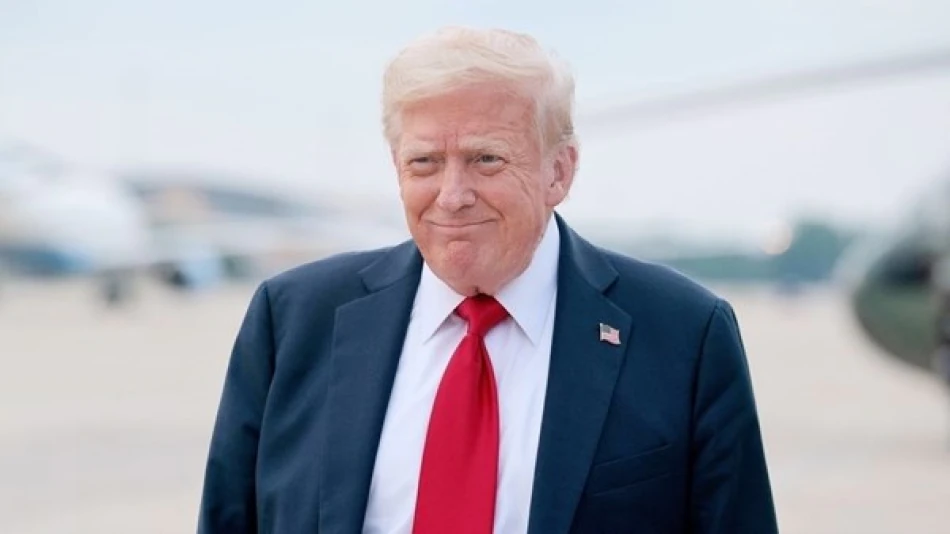
Trump Wins Legal Challenge to Freeze Foreign Aid
Federal Appeals Court Hands Trump Major Victory on Foreign Aid Freeze
A federal appeals court has overturned a lower court ruling that would have forced the Trump administration to resume billions in foreign aid payments, clearing the way for the president's 90-day suspension to continue. The 2-1 decision by the D.C. Circuit Court of Appeals represents a significant legal victory for Trump's aggressive restructuring of America's foreign assistance programs and signals potential long-term shifts in how the U.S. deploys humanitarian aid globally.
The Court's Reasoning
The three-judge panel ruled that the lower court had overstepped its authority when it ordered the Trump administration to restore nearly $2 billion in previously Congress-approved foreign aid payments. The decision effectively validates Trump's executive power to halt aid distribution, even when funds have already received legislative approval.
U.S. District Judge Amir Ali, appointed by former President Joe Biden, had initially ruled in favor of humanitarian organizations seeking to compel aid payments to global partners. However, the appeals court's majority found this judicial intervention inappropriate, suggesting that foreign aid distribution falls more clearly within executive branch discretion than previous legal precedent indicated.
Beyond the Freeze: Systematic Dismantling of Aid Infrastructure
Trump's January 20 executive order—issued on his first day back in office—represents more than a temporary pause. The administration has simultaneously launched what amounts to a systematic restructuring of America's foreign aid apparatus, targeting the U.S. Agency for International Development (USAID) specifically.
USAID Under Siege
The agency, which has operated with relative independence since its establishment in 1961, now faces potential absorption into the State Department. This represents a fundamental shift from the Kennedy-era model that treated development assistance as a distinct diplomatic tool. The administration has placed numerous USAID employees on extended leave, effectively hollowing out institutional expertise built over decades.
This approach mirrors similar consolidation efforts during Trump's first term but appears more comprehensive and systematic. Unlike the 2017-2021 period, when aid cuts faced significant bureaucratic resistance, the current administration appears to have learned from past implementation challenges.
Global Implications and Precedent
The court decision arrives as other major powers are expanding their humanitarian footprints. China's Belt and Road Initiative continues despite economic headwinds, while the European Union has increased development spending following the Ukraine conflict. Trump's aid suspension creates a potential vacuum that competing powers may seek to fill, particularly in strategically important regions like sub-Saharan Africa and Southeast Asia.
Historical Context
Previous attempts to dramatically restructure foreign aid have typically faced judicial or congressional pushback. The Reagan administration's efforts to redirect aid toward military assistance rather than development programs met significant legal challenges. However, the current appeals court ruling suggests that judicial deference to executive foreign policy decisions may be strengthening, potentially giving Trump broader latitude than his predecessors enjoyed.
Market and Strategic Consequences
The aid freeze affects more than humanitarian outcomes—it disrupts established supply chains and contractor relationships worth billions annually. Defense contractors and development organizations that have built business models around predictable aid flows now face fundamental uncertainty. This could accelerate industry consolidation as smaller players lack resources to weather extended funding gaps.
For recipient countries, the suspension forces rapid diplomatic recalibration. Nations that have structured budget planning around anticipated U.S. assistance must now seek alternative funding sources or scale back programs. This dynamic particularly affects middle-income countries that receive significant U.S. aid but may not qualify for emergency humanitarian assistance from other donors.
Legal Precedent and Future Challenges
The appeals court's reasoning establishes important precedent for executive power in foreign policy implementation. By rejecting judicial oversight of aid distribution, the court has effectively expanded presidential discretion over congressionally appropriated funds—a principle that could extend beyond foreign assistance to other areas where legislative and executive priorities diverge.
However, the 2-1 split decision suggests this legal question remains unsettled. The dissenting judge's reasoning, while not detailed in available reports, likely argued for stronger congressional prerogatives over appropriated funds. This tension virtually guarantees further legal challenges and possible Supreme Court review, particularly if the aid suspension extends beyond its initial 90-day timeframe.
Most Viewed News

 Layla Al Mansoori
Layla Al Mansoori






